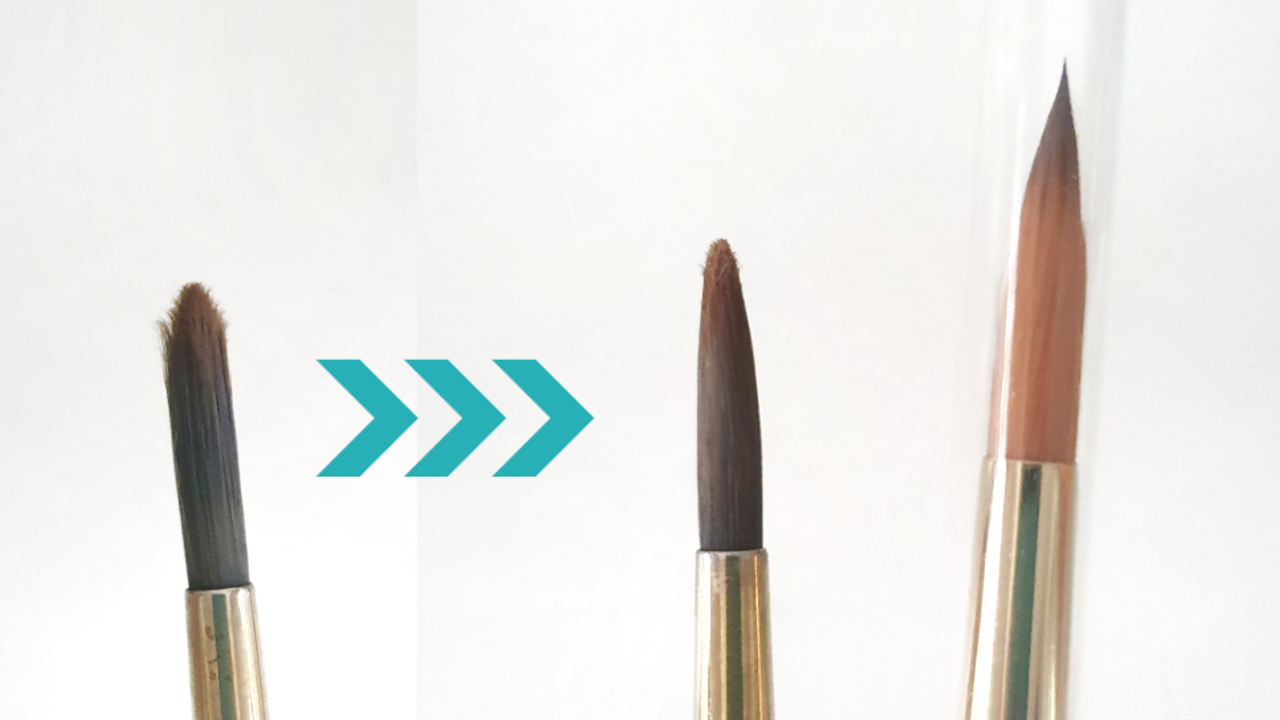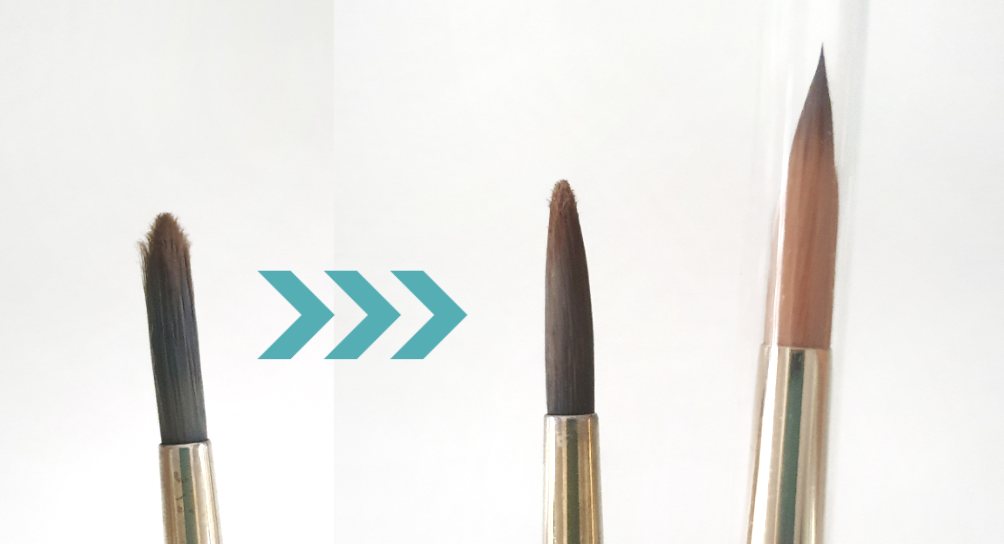
How to clean, care for and extend the life of your watercolour brushes
I don't know about you, but I loooooove to scrub the dear life out of my brushes. I dunno what it is, but I just need those yummy textured strokes all up in my paintings. Dry brushing. Scumbling. They just do something to me.
But do you know what they do to my BRUSHES?
Damage.
I've been using the same 3 brushes for the last 3 years, and I've finally replaced them. I wanna share with you how I deep-clean them, some general care tips, as well as some new things I'm going to start doing to prolong the life of my new brushes. Let's go!
HOW TO CLEAN WATERCOLOUR BRUSHES
The quickest and easiest way to clean your brushes day-to-day is to make sure you get all of the paint out before you set them aside to dry off. Swishing and figure-8s in your water jar should be enough to make sure you can paint down water without any residual colour appearing, but eventually you'll need to perform a deep-clean. It'll really depend how often you use your brushes for how often you need to do this. In between this though, rinse thoroughly, use a paper towel or similar to wipe off any paint build up on the ferrule (bit that connects bristles to handle) and handle, and leave flat to dry.
When it comes to a deep-clean, I really thought professional brush soap was a CAPITALIST GIMMICK... until I tried some. Master's brush soap is the one I bought, and it was around $20. I've had people tell me theirs has lasted them 20 years, so it's definitely worth it in the long run! But if you aren't ready for that, I got away with cleaning mine in my palm over the sink using some hand soap. Swish the bristles in your palm and watch the colour dislodge from the ferrule.
If you get yourself some brush soap, dip your "clean" brush into a little bit of water then swish it around the soap container, being careful not to bend the bristles. It is WILD how much colour comes out. I've got a video here if you'd like to see the process. Once you've rinsed and repeated this until it's CLEAN-clean, you can set aside on a flat surface to dry. If your bristles have become bent out of shape (guilty) you can also apply a liberal amount of brush soap to the bristles, gently pull the bristles to a tip, and leave it in to dry overnight. This will condition the bristles and help bring back the original shape. Don't forget to thoroughly rinse out before your next painting!

Above is the before vs after cleaning of my 3yo brush vs a brand new brush, using Master's brush cleaner to clean it and try to get the point back. The brush on the right is the exact same brand and line - how much different does it look though?? The old one has not only discoloured over time, but severely lost the sharp point it once had. I've got some general tips below but the last section is things I'll be doing differently to try and avoid this happening again, or at least prolong the outcome.
GENERAL CARE TIPS
- Never leave your brush sitting in a water jar, the water can expand the wood and loosen the grip of the ferrule as well as causing the handle (if wood) to split or rot
- Don't jam your brush on the bottom of the water jar to rinse colour off, you will *hurt* your bristles - and honestly, my feelings. Swishing and figure-8ing should be enough between deep-cleans
- Don't store brushes bristles-up in a container until FULLY dry. Water can seep down and... see above. Lay flat to dry on a paper towel after use, even better pointing the tip on a slight downward angle
- Y'know the handy dandy plastic tube that is on the bristles of a new brush? Bin it after removal. Trying to put it back on will only damage the bristles. Look for a brush travel case instead if you need to transport them safely. Art stores usually carry affordable zip around cases with elastic holders
- When you get a new brush and it's all stiff and weird, clean that off over the sink (not in your paint water jar) before use. Just swish in the palm of your hand until it comes loose. It's a glue-like solution they're coated in for display before sale
WHAT I'LL BE DOING DIFFERENTLY
- Use a dedicated (or just old) brush specifically for scrubbing, scumbling and lifting colour on my paintings - rather than using the brushes I paint with. I have no doubt doing this contributed to the loss of point on my brushes. There are specialty scrubbing brushes out there if you're interested, but I have heard they can be a little too rough and damage your paper
- Use a dedicated (or again, just old) brush specifically for mixing colours on my palette. I use pan paint and mix from the primaries, so my brushes spend a lot of time scrubbing over dry paint to create lots of mixes. Again this likely contributed to my brushes losing their point
- Using a spritzer or a dropper to pre-wet my paints and soften them a little before use
What's the longest one of your brushes has lasted? Let me know! And feel free to shoot me any brush care tips you think are missing from my list and I'll gladly add to it with credit to you :)
--Emma
P.s. the 3 brushes I use are Princeton Heritage rounds in sizes 3/0, 6 and 8.

